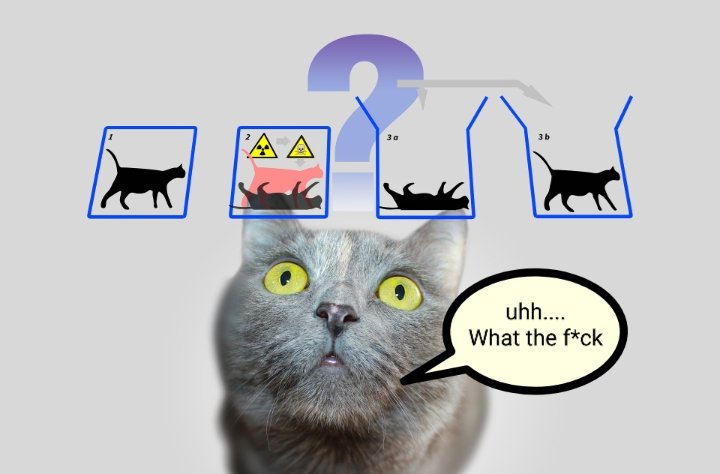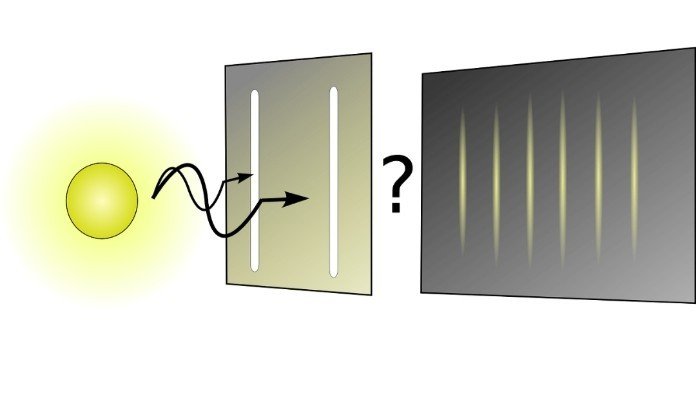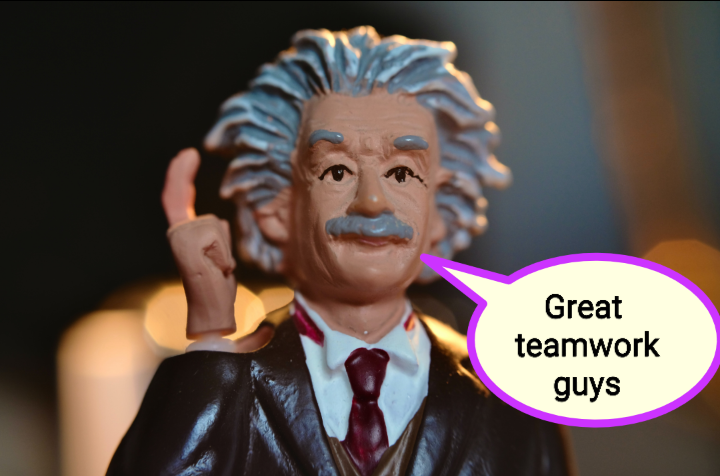Understanding Determinism, Predeterminism And Superdeterminism (Part 2)
In our previous article we were able to discuss about determinism (causal) and predeterminism, this article on the other hand is the remaining part of the previous article and we shall be discussing about superdeterminism and it's relationship with quantum mechanics.
We shall however start with a scenario depicting a superdeterministic event and it would be another variant of the kind used in the same previous article mentioned earlier.
Consider a situation where you happened to look through the window in your house and you happened to observe a stranger in your neighbor's house trying to break into a safe, and somehow you wish to intervene - get hold of the stranger and expose him/her. Due to your freewill, you had analyzed the situation and realized that the only plausible way to get hold of the stranger (without the stranger noticing that you are coming) is to teleport to your neighbor's house, which you had the ability to do. In this case, we would assume that the teleportation is in the form of dematerialization (in your house) and materialization (in your neighbor's house). Eventually, you did teleport to your neighbor's house but found out that the stranger is no longer there and that the safe and it's content are intact. To further mystify the scenario, you repeated the process a couple of times and observed the same result, that is, each time you returned to your house and looked through the window you see the stranger trying to break into the safe but when you teleport to get hold of the stranger, you don't get to see him. One question should then arise, which is that
How does the stranger know you are coming ?
Ideally speaking if planned well, especially the location you teleported to, you should have gotten hold of the stranger but in this case irrespective of the location you get to through teleportation, you don't get to catch the stranger and his act. From the context of quantum mechanics, there are two ways of answering the question and they are given below.
- Immediately you made the act of teleporting, the information about your intentions was propagated instantaneously to the stranger who then cleans his act and exits the house (before you arrived). The concept of instantaneous propagation is sometimes called "spooky action at a distance" and from another perspective implies the information can move faster than light. To understand why instantaneous propagation is sometimes interpreted as faster than light, we could assume that the stranger can be located light-years away from you and in our universe the fastest carrier of information is light/electromagnetic radiation, with it's speed (light speed) it could take years to arrive at the stranger but when the information can instantaneously get to the stranger who is light-years away, it implies that the information must have propagated faster than light and according to mainstream physics would violate one of the core principles of special relativity - nothing can move faster than the vacuum speed of light. This is part of the reasons why some physicists, including early founders of quantum mechanics (such as Einstein) frowned upon quantum mechanics as being a complete theory of the atomic and subatomic world. We should note Bell's theorem which supports "spooky action at a distance" has been verified experimentally.
- To avoid the instantaneous propagation of information, another plausible way of answering the question is to assume some unknown physical process (not violating the cosmic speed limit) had informed the stranger. The corresponding theory of this unknown physical process is termed hidden variable theory. In our scenario, one plausible hidden theory is that during the process of your dematerialization (a relatively slow process) in your house, another entity (probably human-like) quickly materialized in your neighbor's house and informed the stranger, thereby causing the stranger to clean his/her act and exit the house. At the moment when you want to start materializing in your neighbor's house, this human-like entity dematerializes, so that when you have fully arrived in your neighbor's house, you neither see this human-like entity nor the stranger. The idea of the universe bringing into existence a human-like entity when you teleport can be considered a hidden law/theory, that is, it is a law of nature that is yet to be discovered/known and because you are not aware of this law, certain observations in this scenario might seem weird to you (the observer) and in most cases may result in the use of statistical/probabilistic techniques in your analysis. For example, when you are not doing anything, your assumptions would be that there's a 50% chance that the stranger is performing the act and another 50% chance that he is not, and that only observation gives you a 100% chance of seeing the stranger in one act.
However, there is more to this scenario if we assume the second solution (appearance of a human-like entity) were to be true and one of them is that there now exist correlations between what you do and what the stranger does. For example, if you notice from our scenario, when you look through your window (one of your action) the stranger tries to break into a safe and if you teleport (another of your action) to your neighbor's house, you don't see the stranger (because your action caused the universe to bring into existence a human-like entity that informs the stranger). It is also likely possible that if you take another kind of action, the stranger too would take an action different from the aforementioned ones. If we happened to have a model that is to predict everything that the stranger would do in this kind of scenario, then your actions must be taken into account in the model. What this also means is that apparently you are deciding the initial conditions of the stranger. This kind of determinism of which there exists correlation between the actions of the observer (you) and that of the observed (stranger) is called superdeterminism.
In the case of causal determinism as seen in our previous article, there is no correlation between your action and that of the stranger, that is, in a causal deterministic model, you can predict what the stranger would do without involving your actions and it also means that even if you teleport to your neighbor's house, you should still get hold of the stranger in the act of trying to break into the safe (as was the case when you looked through your window). As a matter of fact, classical physics is mostly causal deterministic.
Before we compare superdeterminism with predeterminism, we should note that the initial conditions of a superdeterministic model can also be traced back to the beginning of the universe. The difference between the initial conditions of a superdeterministic model at the beginning of the universe and that of a predeterministic model is that for the predeterministic model, the initial conditions (at the beginning of the universe) are fixed and independent of the actions of objects that exists after the beginning of the universe but for a superdeterministic model the initial conditions (at the beginning of the universe) are not fixed, they can depend on certain actions of an observer that exists after the beginning of the universe, one way of viewing this is like performing an action now and the action travels back in time to probably around 13.8 billion years ago (the beginning of our current universe) and alters certain initial conditions around that time (beginning of the universe) which in turn alters the state of the physical process that we are observing now. As insane as it may seem, this is what happens in a superdeterministic model/universe.
But one should not make the mistake of thinking that the stranger in our superdeterministic scenario doesn't have freewill, he in fact does and it's the reason why the human-like entity was introduced. It is the human-like entity that doesn't have freewill, it is been controlled by you and the universe, that is, certain actions of yours and the universe decides the existence and state/actions of the human-like entity. The stranger on the other hand has the option of ignoring the human-like entity but in most cases he would have to listen because "he doesn't want to get caught".
In the context of quantum mechanics where we deal with particles (that don't have freewill), we can eliminate such human-like entity and in such case, certain actions of the observer and the universe directly influences the state/actions of the particles - note that the particles have now replaced the stranger.
The scenario presented in this article is somewhat analogous to the kind observed in the double-slit experiment or the delayed choice experiment and the explanation of superdeterminism in this article can be used to make sense of observations. What superdeterminism is simply saying is that outcomes in those experiments are predictable and that any theoretical/mathematical model that would make attempt to predict the outcomes must take into account certain actions of the observer (the experimental set up).
In this article we have seen that what Bell seemed to be calling superdeterminism (see previous article) is actually predeterminism - the universe decides the fate of everything (including the observer), hence nothing has freewill. The actual superdeterminism suggests that even if the initial conditions can be traced back to the beginning of the universe, there still can be freewill, especially for the observer, only that certain actions of the observer can alter these initial conditions and in turn affect the outcome of what the observer is observing.
One downfall of superdeterminism as a true quantum mechanical interpretation is that it maybe impossible to test experimentally, most especially if the initial conditions can be traced back to the beginning of the universe, thus making it more of a religious concept than a scientific one.
It is here we conclude this article, have a thoughtful day and see you next time.
For further reading
How Bell’s Theorem Proved ‘Spooky Action at a Distance’ Is Real
Superdeterminism may have solved the quantum measurement problem
Does Superdeterminism save Quantum Mechanics? Or Does It Kill Free Will and Destroy Science?
Thank you all once again for stopping by to read my jargons and also thank you @juecoree, @lemouth and the @Steemstem team for your valuable supports.
Lastly, please don't forget to do the needful
Upvote
Comment
Reblog
If you enjoyed my jargons.




After a two week hiatus from the platform, it is good to read interesting discourse such as presented in your blog. I read the first part to see the full context. I am not quite familiar with the ideology but I think it someone relates to causality and consciousness.
I agree with your premise that the differential equations (governing equations) can correctly predict outcomes in nature if we properly find the initial conditions. We are bound to make mistakes if the starting point isn't determine correctly.
It is a lot to take especially I am unfamiliar, but it is good write up that encourages me to look at it in the net.
!discovery 25
This post was shared and voted inside the discord by the curators team of discovery-it
Join our community! hive-193212
Discovery-it is also a Witness, vote for us here
Delegate to us for passive income. Check our 80% fee-back Program
Thanks for your contribution to the STEMsocial community. Feel free to join us on discord to get to know the rest of us!
Please consider delegating to the @stemsocial account (85% of the curation rewards are returned).
You may also include @stemsocial as a beneficiary of the rewards of this post to get a stronger support.